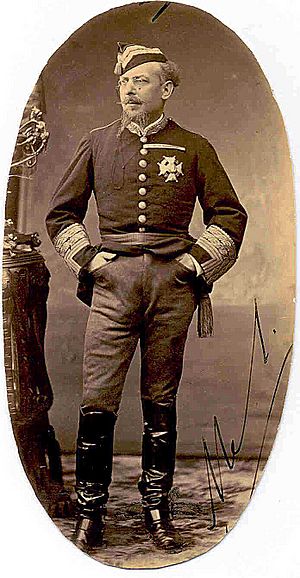Manuel Pavía y Rodríguez de Alburquerque facts for kids
Manuel Pavía (born August 2, 1828 – died January 4, 1895) was an important Spanish general. He was born in Cadiz. Pavía played a big role in Spanish politics during the second half of the 1800s. He was part of the Revolution of 1868. This event removed Queen Isabella II from power. Later, he led a coup d'état (a sudden takeover of power). This coup ended the First Spanish Republic. It led to the return of the monarchy with Isabella's son, Alfonso XII, becoming king.
Early Military Career
Manuel Pavía started his military journey in 1841. He joined the Royal Artillery College in Segovia, a military school. By 1846, he became a lieutenant, and by 1855, he was a captain.
Pavía fought in the Hispano-Moroccan War (1859–60). He also took part in a European military mission to Mexico in 1862. After these experiences, he returned to Spain. In 1862, he was promoted to major.
In 1866, Pavía served under General Juan Prim. They tried to start a rebellion against Queen Isabella II's government in Madrid, but it failed. Prim then joined a new political group called the Progressive Party. Later that year, Pavía and Prim tried another rebellion. However, it did not succeed because it lacked public and military support.
After this, Prim and Pavía had to escape to Portugal. They were chased by government forces. During their escape, many Spanish people showed them support.
From Revolution to Monarchy's Return
After two years away, Pavía came back to Spain. He worked with General Prim again. In August 1866, they started a successful revolutionary movement. They made an agreement with another political group, the Federal Democratic Republican Party. This agreement was called the Pact of Ostend.
An armed uprising began in Andalusia. Revolutionary groups, made up of democrats and progressives, had planned it. In September 1868, General Prim landed in Cádiz. His group used the slogan España con honra (Spain with honor). On September 28, Prim won the Battle of Alcolea. Support from Barcelona and the Mediterranean coast helped them win the revolution. Queen Isabella II left the country on September 30. A temporary government was then set up, led by General Francisco Serrano.
During this time, Pavía fought in Navarre at the start of the Third Carlist War. This was a civil war in Spain. When the First Spanish Republic was declared, Pavía and General Arsenio Martínez Campos helped put down a rebellion. This rebellion, called the cantonalist insurrection, started on July 12, 1873, in Cartagena. The rebels wanted to create a federation of self-governing regions.
Pavía and Martínez Campos quickly took back most of the rebel areas between July 26 and August 8. Only Cartagena continued to resist until January 13 of the next year. By the end of 1873, Pavía became the Captain General of New Castile again. This region had its capital in Madrid. He held this position in early 1874. At that time, President Emilio Castelar asked the Spanish Parliament for a vote of confidence, but he was rejected.
On January 3, Pavía, who supported a strong central government, went to the Parliament. He ordered everyone to leave the building. This happened just as a new presidential election was about to take place. This election would have been led by a federalist. With this coup d'état, a new period began for the First Republic. It was led by Francisco Serrano. This quickly led to the return of the monarchy. Alfonso XII, Queen Isabella II's son, became the new king.
During the time of the monarchy's return, Pavía served as Captain General of Catalonia from 1880 to 1881. He was again Captain General of New Castile in 1885. This was during the regency of María Cristina de Habsburgo-Lorena. In 1886, while in this role, he defeated a popular anti-monarchy uprising in Madrid.
Later Life and Death
In his final years, Manuel Pavía was promoted to Captain General. He also became president of the Supreme Council of War and Navy. He spent time writing military histories. Manuel Pavía passed away on January 4, 1895.
See also
 In Spanish: Manuel Pavía para niños
In Spanish: Manuel Pavía para niños
 | Emma Amos |
 | Edward Mitchell Bannister |
 | Larry D. Alexander |
 | Ernie Barnes |


